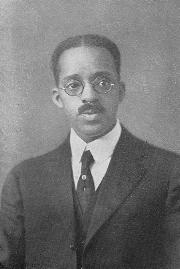

Young Watson laid the foundation of his education in the country public schools of Virginia. For his higher education and theological training he went to Virginia Theological Seminary and College at Lynchburg from which he was graduated in 1919. The story of his struggle for an education cannot be told better than his own simple words. He says: "I was the oldest boy, having one sister older, of a family of eleven children. My parents being poor, I was forced to drop out of public school at the age of fourteen and was hired on a farm at a salary of five dollars per month. I remained on the farm until I was twenty, my father receiving my wages which did not at any time exceed thirteen dollars per month.
After being set free by my father at the age of twenty, I began saving a part of my earning to the end of buying a horse and buggy, the acquisition of which at that time was my highest ambition. After possessing these, I awoke to the fact that there were yet higher things in life and so became dissatisfied.
I entered the Gospel ministry in 1912 and realizing the need of preparation and the finance necessary to obtain same, I went to work in the Norfolk and Western Rail Road shops at Roanoke, Va. This work paid a better wage than I had received as a farm laborer, so I remained here until October 1, 1913, at which time I left to matriculate at Virginia Theological Seminary and College, Lynchburg. When I entered school I had $150.00 in cash and $100.00 in bonds, my sole resource for beginning a six year course in boarding school. I spent all my cash the first year and was at a loss as to what I should do the other five years. I realized that I could not earn enough during vacations to support me eight months in school each year, so before school closed in the spring of 1914, I secured a position for the next winter to work mornings and evenings and attend school. For this work I received $5.00 per month and board. I remained here two winters and one summer. My school work grew heavier each year and thus it was impossible for me to continue my menial labor and do my best work in school. Consequently I discontinued this work and gave my entire time to my studies, as I was taking both a literary and theological course. By persistent effort and a determined will and doing such work during vacations and other times as would prove most profitable, also doing some local preaching from which I derived aid, I completed my courses.
I came out of school in May, 1919, with a small indebtedness and accepted my first pastorial charge, which was a small country church, at a salary of $18.00 per month or $216.00 per year. With faith in God, humanity and myself, I accepted my task humbly, striving to render the best service possible, feeling that in the natural order of things promotion would surely come." Mr. Watson was converted when about 14 years of age and joined the Castle View Baptist church. He was called to preach in 1912, and was licensed by his home church in 1912. He was ordained to the full work of the ministry by the same church, July 28, 1919. As he looks back over the days of boyhood and youth, he realizes that the influences of his home life was a powerful one in shaping his life and that even the hardships of securing an education were in some way transmitted into character. His first pastorate was at Catawba in Virginia, where he preached a little more than a year. From there he was called to Elkhorn and Powhatan, W. Va., and served those churches for sixteen months. On August 1, 1921, he went to Montgomery, W. Va., where he has already firmly established himself in the work and in the esteem of the people. He is a pleasing and forceful speaker and makes friends for himself and for his work wherever he goes.
In politics he is a Republican and holds membership in the Masons.
On September 1, 1920, he was married to Miss Minnie G. Hopkins of Virginia, a story of whose work appears below.